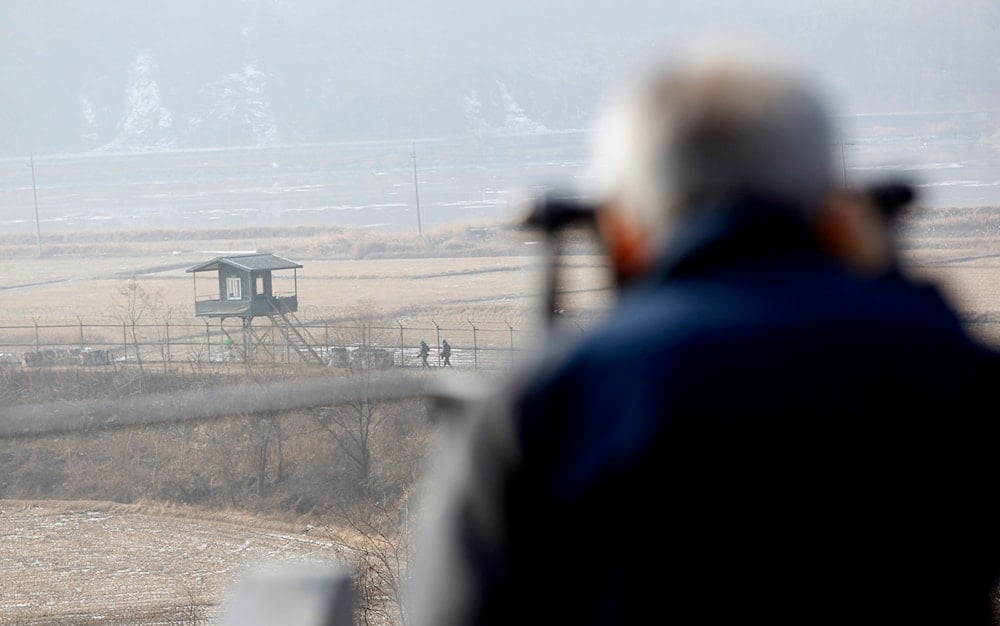Seoul halts 'Voice of Freedom' to ease tensions with DPRK
South Korea suspends the "Voice of Freedom" psychological warfare broadcast to ease tensions with the DPRK, under President Lee Jae Myung’s new policy.
-

A visitor uses binoculars to watch north side as South Korean soldiers patrol near the border village of the Panmunjom (DMZ) that separates the two Koreas, north of Seoul, South Korea, on December 29, 2011. (AP)
South Korea has suspended its decades-old "Voice of Freedom" broadcast, a psychological warfare radio transmission aimed at the Democratic People's Republic of Korea (DPRK), the Defense Ministry announced Monday. The decision comes as part of a broader policy shift under President Lee Jae Myung to reduce tensions on the Korean Peninsula.
Ministry spokesperson Lee Kyung-ho stated that the suspension is part of efforts to "ease military tensions with the North." The "Voice of Freedom" broadcast, which began in 1962, transmitted outside information and South Korean pop music into the DPRK, where access to foreign content remains highly controlled.
The radio broadcast has been intermittently active for over six decades, depending on the state of South Korea–DPRK tensions. It was previously halted in 2004 during a period of rapprochement, but resumed in 2010 following what Seoul claims was a DPRK torpedo attack on the warship Cheonan, which resulted in the deaths of 46 South Korean sailors. The results of the investigation into the attack were disputed by other states, including China.
South Korea has also ceased operations of propaganda loudspeakers along the Demilitarized Zone (DMZ) and removed several of the installations.
Policy shift under Lee Jae Myung
Since assuming office in June, President Lee Jae Myung has outlined a new approach toward Pyongyang, prioritizing dialogue and confidence-building measures. He has pledged to foster military trust with Pyongyang despite Seoul's concerns over the DPRK’s nuclear weapons program.
The DPRK has categorically rejected Seoul’s overtures, accusing the South of duplicity. Pyongyang has criticized Lee’s calls for denuclearization as disingenuous, arguing that such statements betray an underlying confrontational policy.
According to the Korean Central News Agency (KCNA), the DPRK described Lee as a "hypocrite," stating he had "pretended that he had a will to restore the relations" but had instead revealed "his true colours as a confrontation maniac” with his recent rhetoric.
The agency reiterated that the DPRK would "remain unchanged in our stand not to abandon the nuclear weapons, the prestige and honor of the state."
This is not the first time Lee has attempted to ease tensions with the DPRK. Earlier last month, on August 15, he reached out to Pyongyang in an attempt to begin dialogue without preconditions, a shift from the more outwardly hawkish policies of his ousted predecessor, Yoon Suk Yeol.
During an event celebrating the anniversary of liberation from Japanese rule, he said that his government "will take consistent measures to substantially reduce tensions and restore trust" with Pyongyang.
"We affirm our respect for the North's current system," Lee further stated, adding that Seoul had "no intention of engaging in hostile acts [...] I hope that North Korea will reciprocate our efforts to restore trust and revive dialogue."
South Korea's propaganda broadcasts were a source of tension between the two countries, and led to a tit-for-tat campaign between the two Koreas last year when the DPRK sent roughly 2,000 trash-carrying balloons southward in what it said was payback for propaganda balloons that South Koreans had launched.
The South Korean military announced then, last year in July, that it was expanding the scope of its frontline propaganda broadcasts in retaliation for the balloons.

 3 Min Read
3 Min Read








